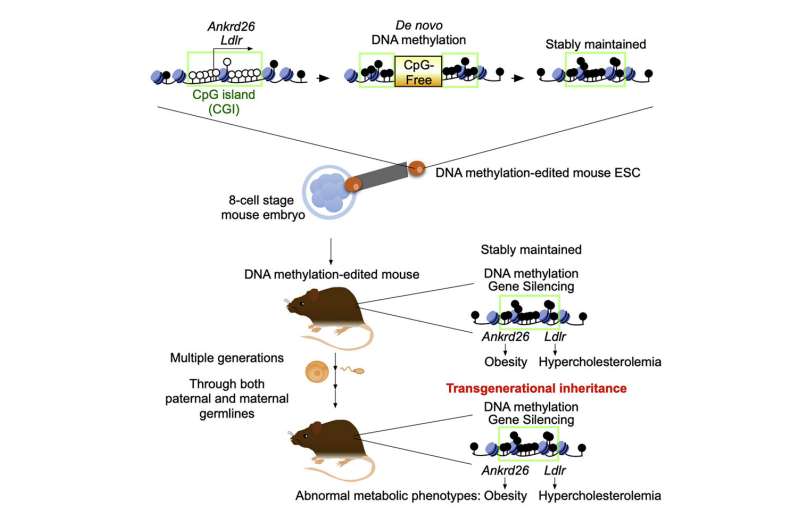February 21, 2023 report
This article has been reviewed according to Science X's editorial process and policies. Editors have highlighted the following attributes while ensuring the content's credibility:
fact-checked
peer-reviewed publication
trusted source
proofread
Demonstration of transgenerational epigenetic inheritance in methylation-edited mammal for the first time

A team of genetic engineers at the Salk Institute for Biological Studies, working with a colleague from Universidad Católica San Antonio de Murcia, has demonstrated transgenerational epigenetic inheritance in a methylation-edited mammal for the first time. In their paper published in Cell, the group describes engineering an epigenetic mutation in test mice and tracking the change across four generations of offspring.
Back in the 1990s, medical scientists discovered that changes in genetic expression were not always due to changes in sequences of DNA. They found that behavioral and environmental factors can impact the means by which genes are turned on or off. The most common factor was found to be DNA methylation, in which a methyl group molecule attaches to a strand of DNA and from then on controls the activation of the associated gene.
Subsequent research has shown that genome methylation is common. More recently, medical scientists have found that DNA methylation can be passed from parent to child despite no changes to the DNA itself—how this is possible is still a mystery. In this new effort, the team in California has found that such changes can be passed down through multiple generations in mammals.
The work involved adding specific methyl group molecules to two sites on the genome of test mice. This prevented two genes associated with metabolism from activating. They then injected the engineered cells into mouse embryos that were then placed into the uterus of a surrogate mouse. The development of the mice was then followed from birth to 10 months.
All of those with engineered cells developed obesity, as was expected. The research team then bred the obese mice with unmodified partners and studied their offspring. Those offspring were then bred with other mice and so on for four generations. All four generations had the modified allele and all developed obesity.
The team ran the experiment several times, using engineered males in some runs with un-engineered females and sometimes with engineered females mating with un-engineered males. It made no difference; the obesity remained. How such traits were passed on remains a mystery.
More information: Yuta Takahashi et al, Transgenerational inheritance of acquired epigenetic signatures at CpG islands in mice, Cell (2023). DOI: 10.1016/j.cell.2022.12.047
Journal information: Cell
© 2023 Science X Network



















